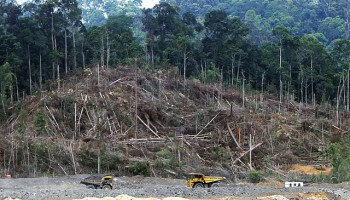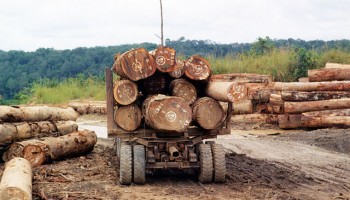Illegal, unreported and unregulated fishing is on the rise globally. As worldwide consumption of fish rises, including in the United States, stocks are dwindling. 85 percent of fish species have been harvested to their biological limit.
This has led to a boom in something called fish laundering.
Fish are laundered through a process called transshipment, whereby large cargo ships with proper fishing permits rendezvous on the high seas with smaller, illegal fishing vessels to receive their daily catch.
The cargo ships ostensibly keep logs, but under-resourced countries such as those in West Africa and the Pacific often cannot regulate the industry. Log books can easily be fabricated, and authorities have trouble determining where catches come from.
The trade in illegal fishing products linked to criminal activity accounts for somewhere between $10 billion and $23.5 billion a year, according to a 2015 article published by the Ecology Law Quarterly.
The EU said it signed the “landmark” funding agreement with several marine agencies at the Pacific Islands Forum meeting in Naura on September 5.
The agreement seeks to more closely monitor fishing practices and crack down on violations.
Christopher Wagner of the EU delegation for the Pacific said regulation of illegal catches passing through Pacific ports will improve, and prosecutions and fines will increase.
“What we are supporting through this programme is to develop new technologies and monitoring, for example drones, we are also working through the FFA (Forum Fisheries Association) with the countries to look more at trans-shipments,” he told Radio New Zealand.
But fish aren’t the only ones at risk. A 2015 investigation by the Associated Press revealed the role of slave labor in Thai fishing enterprises. Greenpeace has been investigating slavery in illegal fishing for years, publishing an in-depth study in 2016.
Organizations like Global Fishing Watch (GFW), however, have made use of advancing satellite technology to track ship movements via leaked GPS data.
The group found that of about six thousand likely transshipments cataloged between 2012 and 2016, about 43 percent occurred in the high seas, where there is little oversight.
Much like companies who offshore funds for tax purposes, fish launderers send eighty percent of their catches to be processed in Asian countries, where safety and labor standards are lax.
"Oceans are essential, ensuring food, livelihoods, biodiversity and climate resilience. They are increasingly under threat through unsustainable management practices, accelerated by the negative effects of climate change,” Jean-Louis Ville, who heads the European Commission’s regional unit, said.
“So if we do not act today, we compromise all of our tomorrows,” he added.






